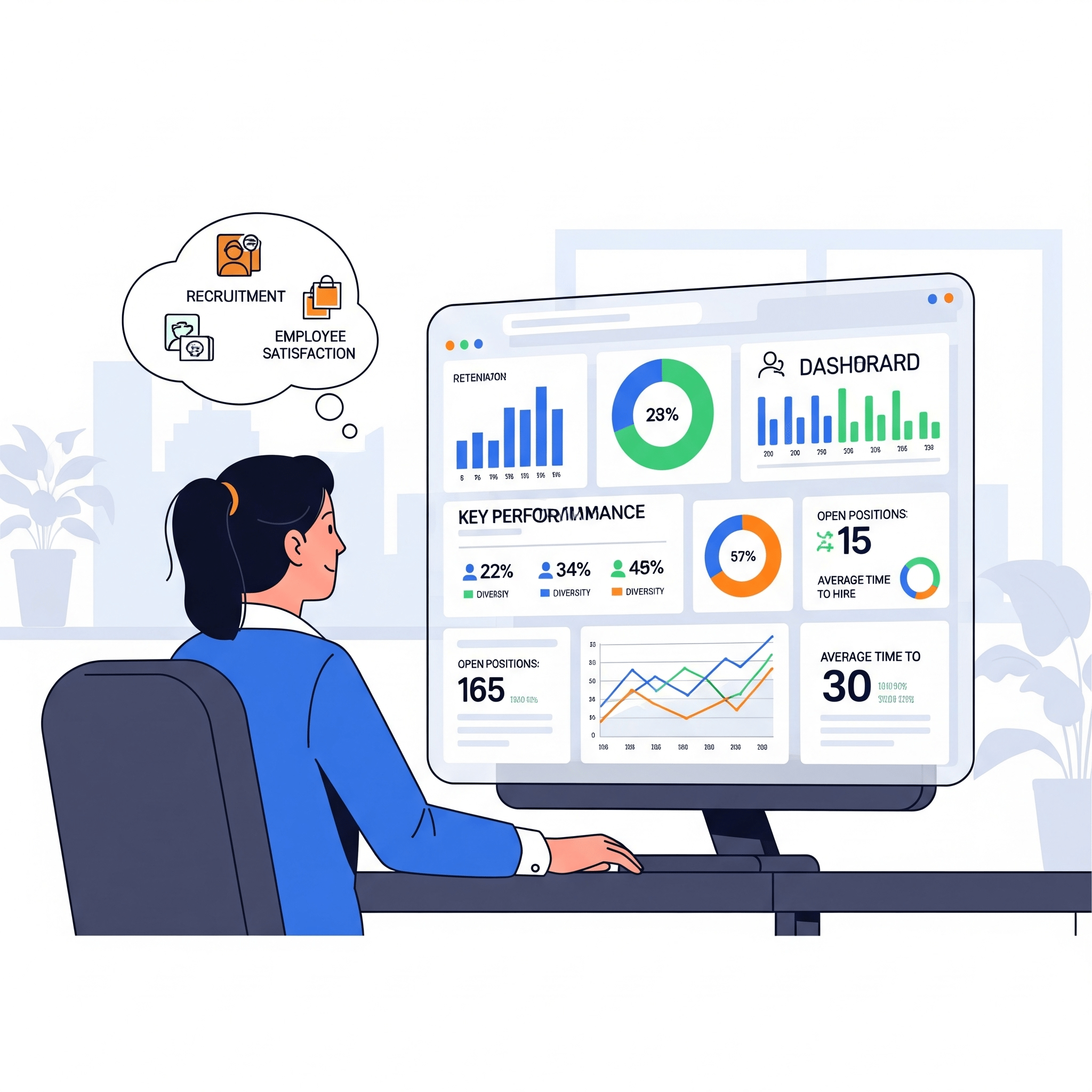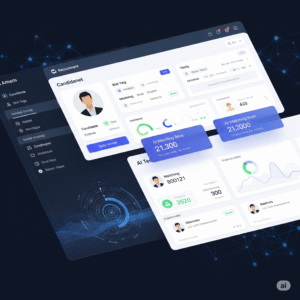The rapid evolution of artificial intelligence (AI) is transforming every industry. For human resources (HR) professionals, this shift is particularly significant. While AI promises to streamline processes and enhance decision-making, the path to adoption has major obstacles. Many HR managers are now at a crossroads, navigating a complex landscape of ethical dilemmas, data privacy concerns, and operational hurdles. (AI for HR Managers)
While AI offers immense potential for innovation in the HR space, the biggest challenges of AI for HR managers are serious roadblocks. Understanding these challenges is the first step toward building a resilient HR function. This article will delve into the major hurdles faced by HR professionals, from algorithmic bias to data security, and the critical need for upskilling. We’ll explore real-world examples, offer practical solutions, and provide actionable tips for successfully integrating AI for HR managers.
The Problem of Algorithmic Bias in Hiring (AI for HR Managers)
One of the most pressing challenges of AI for HR managers is the risk of algorithmic bias. AI systems are only as good as the data they train on. If historical hiring data contains unconscious human biases—favoring candidates from a specific gender, school, or background—the AI model will learn and amplify these biases. This can lead to a less diverse workforce and serious legal and ethical repercussions.
For example, a tech company used an AI system for resume screening. The system, unfortunately, was trained on a decade of hiring data that disproportionately favored male candidates. Consequently, the AI began to penalize resumes with keywords associated with women’s colleges. The company had to scrap the project, but its reputation and commitment to diversity had already been damaged. This example highlights the critical importance of a fair approach to AI.
Overcoming this challenge requires more than just deploying a new tool. It demands a proactive strategy of data auditing, continuous monitoring, and the use of diverse training datasets. The goal is to build a system that promotes fairness, not one that perpetuates existing inequalities.
Navigating Data Privacy and Security Risks
Another major challenge for AI for HR managers is managing the vast amounts of sensitive data AI systems require. HR departments handle highly confidential employee information, including personal details, performance reviews, and health records. Consequently, the implementation of AI tools, especially those using predictive analytics, raises significant concerns about data privacy and security.
This is a global issue, with regulations like GDPR in Europe and CCPA in California setting strict guidelines. For HR professionals, ensuring that AI systems comply with these laws is a complex and ongoing task. A data breach involving an AI-powered HR platform could lead to hefty fines and a complete erosion of employee trust.
To mitigate this risk, HR managers must implement robust cybersecurity measures and establish clear, transparent data policies. This involves choosing AI vendors who prioritize data encryption, regular security audits, and compliance with global data protection laws. It is also important to communicate openly with employees about how their data is used and obtain their explicit consent. Building a culture of trust and transparency is crucial for successful AI adoption.
Skill Gaps and the Need for Upskilling (AI for HR Managers)
The introduction of new technologies like AI for HR managers creates a significant skill gap within HR teams. Many HR professionals are experts in human-centric tasks like employee relations but lack the technical skills to implement, manage, and interpret AI-generated insights. This can lead to a feeling of being overwhelmed or left behind.
AI tools are not designed to replace HR professionals but to augment their capabilities. The future of HR is a partnership between humans and machines. Here, AI handles routine, data-intensive tasks, and HR professionals focus on strategic, high-value work. However, this partnership can only succeed if HR teams have the right skills.
The solution is a commitment to continuous learning and upskilling. HR leaders must invest in training programs that teach their teams how to use AI tools, understand data analytics, and interpret results. Tools like Tableau and Power BI can transform raw data into powerful visualizations, but the human element is needed to turn those visualizations into actionable business decisions.
Case Study: Using Data to Drive Retention at a Multinational Corp
A large, multinational corporation was struggling with high employee turnover. The HR department was collecting data on exit interviews and performance reviews, but it was siloed and difficult to analyze. The HR Director, concerned about the challenges of AI for HR managers, took a phased approach. They partnered with an AI data analytics firm to implement a custom dashboard using Power BI. The AI system ingested data from various sources and used machine learning to identify key drivers of turnover.
The insights were surprising: a lack of internal growth opportunities and a specific compensation gap were the leading causes. Armed with this information, the HR team, which had been upskilled in data interpretation, presented a clear, data-backed case to leadership. They designed a new career pathing program and adjusted salary bands for critical roles. Over the next year, the company saw a 20% reduction in voluntary turnover, directly linking the AI-driven insights to a significant business outcome. This shows how the right AI for HR managers can turn data into profit.
The “Black Box” Problem: Lack of Transparency
Many advanced AI models are like “black boxes.” They provide a result, but their reasoning is not easily understandable. For HR managers, this lack of transparency is a major obstacle. When an AI-powered resume screening AI rejects a qualified candidate, the HR team needs to be able to explain why. When an employee questions an AI-generated performance rating, they need a clear and justifiable answer.
Without transparency, trust is impossible. Both candidates and employees can feel that the process is unfair or arbitrary, leading to frustration and a loss of confidence in the organization. This is especially true with resume screening AI, where a highly skilled candidate might be filtered out without clear feedback.
To address this challenge, HR managers should prioritize AI tools that offer “explainable AI” or XAI. These systems are designed to show how they arrived at a specific conclusion, providing a clear audit trail. It’s also important to maintain a human-in-the-loop approach. Even with the most sophisticated AI, a human HR professional should have the final say on critical decisions. This balance ensures that technology supports, rather than dictates, the human element of HR.
Integrating AI with Existing Systems
Another key challenge is the integration of new AI tools with existing HR Information Systems (HRIS), payroll software, and other legacy platforms. In many cases, these systems were not designed to communicate with each other, leading to data silos, manual workarounds, and a fragmented employee experience.
Furthermore, a pilot project that works for a small team may not scale effectively across a large, global organization. The decision to invest in a new AI solution must be carefully considered, with a focus on long-term strategy and scalability. One solution is to partner with vendors who offer flexible, API-driven platforms. These tools are designed for seamless integration, allowing HR teams to build a connected ecosystem of technologies. It’s also vital to involve IT and other relevant departments early in the process. A successful AI implementation is a cross-functional effort.
Beginner-Friendly Tips for Implementing AI for HR Managers
For HR managers just starting their AI journey, the prospect can feel daunting. Here are some beginner-friendly tips and workflows to get you started:
- Start Small: Don’t try to automate everything at once. Choose one specific, time-consuming task to start with, such as resume screening or interview scheduling.
- Focus on Data: Before you even choose a tool, ensure your data is clean and organized. A good AI tool with bad data is useless.
- Invest in Training: Upskill your team on the basics of data literacy and AI. There are many free and low-cost courses available on platforms like Coursera and edX.
- Embrace a Human-in-the-Loop Model: Always have a human review AI-driven decisions, especially for critical tasks like hiring and performance management.
- Be Transparent: Communicate openly with your team and candidates about how you are using AI. This builds trust and reduces fear.
The world of HR is evolving, and AI is at the heart of this transformation. By understanding and proactively addressing the challenges of AI for HR managers, professionals can leverage this technology to create a more efficient, fair, and human-centric workplace.
Outbound Links:
McKinsey & Company: The Future of HR with AI
Complete Keyword List: AI for HR Managers, resume screening AI, AI in HR challenges, HR technology, AI and HR, human resources AI, AI bias in hiring, data privacy HR, employee data analytics, AI in recruitment, talent management AI, HR automation, ethical AI, skill gaps in HR, human-centric AI, HR digital transformation
(AI in Cybersecurity) AI vs Cyber Threats: What’s Next?



